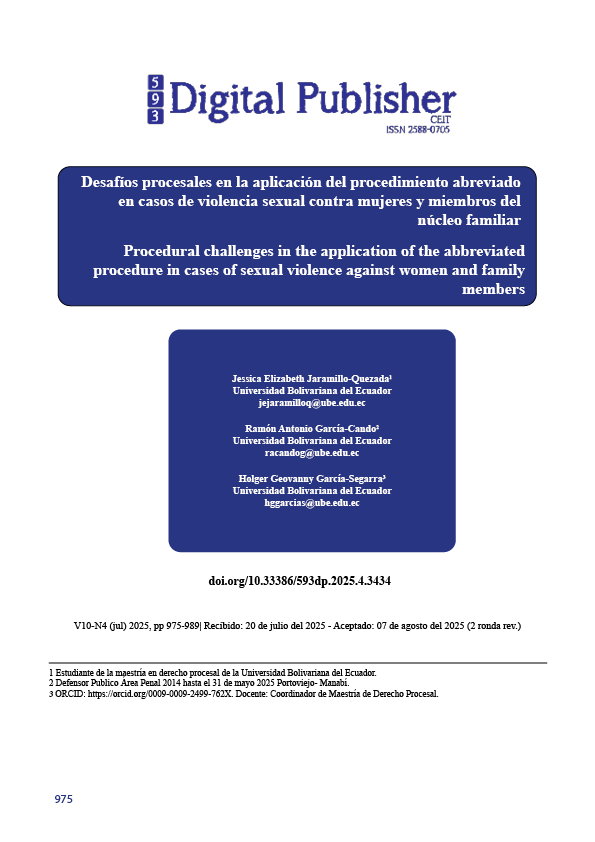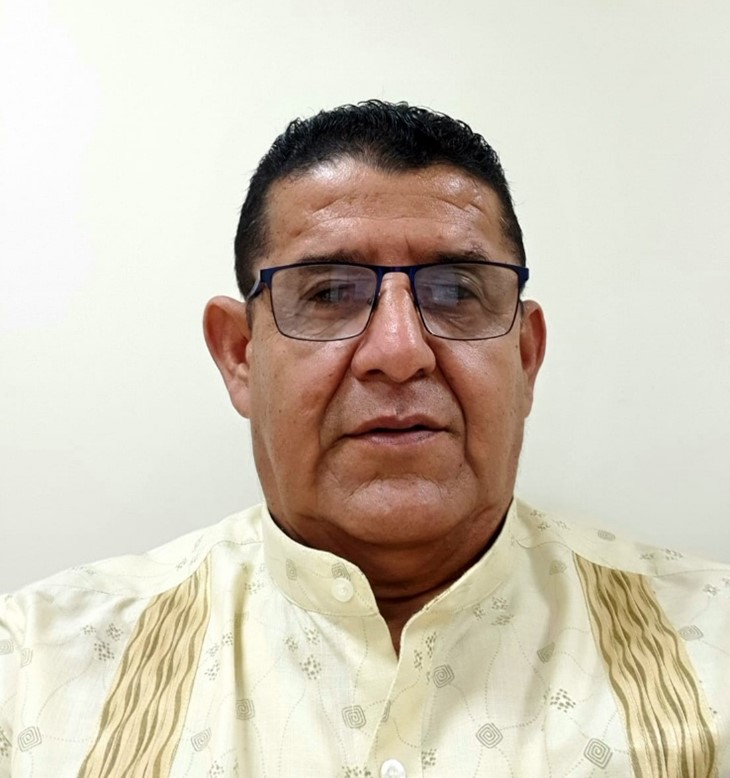Procedural challenges in the application of the abbreviated procedure in cases of sexual violence against women and family members
Main Article Content
Abstract
This research examines the legal and procedural challenges involved in the application of the abbreviated procedure in cases of sexual violence against women and members of the family unit. This legal mechanism, regulated in Article 635 of the Comprehensive Organic Criminal Code (COIP), was established with the aim of ensuring speed in criminal proceedings. However, its use in cases of serious crimes such as sexual offenses has sparked controversy, particularly due to the possibility of sentence reductions for perpetrators, which significantly undermines the principles of justice and comprehensive reparation for victims.
The incorporation of Article 651.1, paragraph 13 of the COIP, concerning the Unified, Special, and Expedited Procedure, has led to contradictory interpretations regarding the applicability of the abbreviated procedure in these cases. Added to this is Resolution 10-2020 of the Plenary of the National Court of Justice, whose Articles 2 (third paragraph) and 3 (subparagraph d) present normative contradictions that generate legal uncertainty for justice system operators.
From a logical-inductive and exegetical approach, this research analyzes the conflict between the need for procedural efficiency and the effective protection of rights, taking into account figures such as the qualified active subject (perpetrator with a family connection) and the passive subject (victim in a situation of vulnerability). The objective is to propose clear legal criteria to guide ethical and rights-based judicial decisions, in accordance with the principles of legality, impartiality, and comprehensive protection.
Downloads
Article Details

This work is licensed under a Creative Commons Attribution-NonCommercial-ShareAlike 4.0 International License.
1. Derechos de autor
Las obras que se publican en 593 Digital Publisher CEIT están sujetas a los siguientes términos:
1.1. 593 Digital Publisher CEIT, conserva los derechos patrimoniales (copyright) de las obras publicadas, favorece y permite la reutilización de las mismas bajo la licencia Licencia Creative Commons 4.0 de Reconocimiento-NoComercial-CompartirIgual 4.0, por lo cual se pueden copiar, usar, difundir, transmitir y exponer públicamente, siempre que:
1.1.a. Se cite la autoría y fuente original de su publicación (revista, editorial, URL).
1.1.b. No se usen para fines comerciales u onerosos.
1.1.c. Se mencione la existencia y especificaciones de esta licencia de uso.
References
Asamblea Constituyente. (2008). Constitución de la República del Ecuador. https://www.asambleanacional.gob.ec/es/constitucion-republica-ecuador
Asamblea Nacional. (2021). Código Orgánico Integral Penal (COIP) (Última reforma). Registro Oficial Suplemento 180. https://www.asambleanacional.gob.ec/es/codigos
Asamblea Nacional. (2018). Ley Orgánica Integral para Prevenir y Erradicar la Violencia contra las Mujeres. Registro Oficial Suplemento 175.
Cámara Nacional de Casación en lo Criminal y Correccional. (n.d.). Jurisprudencia sobre procedimiento abreviado en violencia de género. Buenos Aires, Argentina.
Consejo de la Judicatura. (2025). Procesos judicializados en violencia física, psicológica y sexual [Tablero de datos interactivo]. Recuperado el 4 de agosto de 2025, de https://app.powerbi.com/view?r=eyJrIjoiODE5NWM1MTgtZTNmNi00MjM0LWJkNjktMDRjYmYyODRhOTEzIiwidCI6ImI3MjBlY2QwLTU5Y2QtNDM1OC1iZGM3LWI2MmZlZDUzYzNiNCIsImMiOjR9
Corvalán, V. R. (2010). Derecho procesal penal (1ra ed.). Buenos Aires, Argentina: Nova Tesis.
Corte Constitucional del Ecuador. (2014). Sentencia No. 018-14-SEP-CC. Registro Oficial. https://www.corteconstitucional.gob.ec/
Corte Constitucional de Colombia. (2017). Sentencia C-237/17. Bogotá, Colombia: Autor. https://www.corteconstitucional.gov.co/
Corte Provincial de Justicia del Azuay. (2019). Fiscalía vs. J.A.R.. Cuenca, Ecuador.
Defensoría Pública del Ecuador. (2021). Manual de buenas prácticas para el abogado litigante. Quito, Ecuador.
Méndez, J. L. (2017). El debido proceso en el derecho penal ecuatoriano: Un análisis constitucional. Quito, Ecuador: Editorial Jurídica Ecuador.
Mora, L. (2022). Justicia penal y derechos de las víctimas: Una revisión crítica del procedimiento abreviado. Revista Ecuatoriana de Derecho Penal, 9(1), 45–62.
Organización de los Estados Americanos. (1994). Convención Interamericana para Prevenir, Sancionar y Erradicar la Violencia contra la Mujer “Convención de Belém do Pará” (Ratificada por Ecuador). https://www.oas.org/es/cidh/mandato/Tratados/Convencion_Belem_do_Para.asp
Paredes, A. (2020). La justicia penal desde una perspectiva de género en Ecuador. Quito, Ecuador: Editorial Jurídica Andina.
Uprimny Yepes, R. (2010). Justicia penal, derechos humanos y procedimientos simplificados. Revista Iberoamericana de Derecho Penal y Procesal Penal, (15), 25–47.




